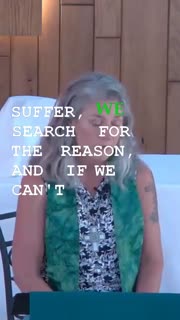Finding Faith and Hope Amidst Suffering
Summary
### Summary
Today, we gathered to explore the profound story of Job and the nature of suffering. We began by recounting Job's tale, a man who faced immense trials yet remained steadfast in his faith. Job's story challenges us to consider the reasons behind suffering and our assumptions about God. We often seek to find causes for suffering, much like Job's friends, who wrongly attributed his misfortunes to sin. However, suffering is a complex reality that can stem from various sources, including human actions, natural disasters, and even our own choices.
We delved into common misconceptions about God, such as the belief that faith protects us from suffering or that suffering is a punishment for sin. These assumptions are flawed, as evidenced by the life of Jesus, who, despite his perfect faith, endured immense suffering. Instead, we are reminded that God is present with us in our suffering, offering comfort and hope. This presence was vividly illustrated through personal anecdotes, including the story of my daughter's struggles with brain damage caused by prenatal alcohol exposure.
We also discussed the role of doubt as a spiritual tool. Doubt pushes us to question and deepen our understanding of God, leading us to a more authentic faith. It is through doubt that we can strip away false beliefs and come to know God more intimately, much like Job did. Ultimately, faith is a choice, a leap not from certainty but from trust in God's love and presence.
As we concluded, we were invited to embrace our doubts and let them guide us to a deeper faith. We prayed together, reaffirming our commitment to follow Jesus and trust in God's love. We were reminded that suffering does not have the final word; God's presence and comfort transform our pain into hope and healing.
### Key Takeaways
1. The Complexity of Suffering: Suffering can arise from various sources, including human actions, natural disasters, and personal choices. It is not always a punishment for sin or a lack of faith. Understanding this complexity helps us avoid simplistic explanations and deepens our empathy for others. [34:18]
2. Misconceptions About God: Common beliefs that faith protects us from suffering or that suffering is a punishment for sin are flawed. Jesus' life exemplifies that even the most faithful can suffer. Recognizing these misconceptions allows us to see God's true nature as a source of comfort and presence in our pain. [39:13]
3. The Role of Doubt: Doubt is not the enemy of faith but a tool that drives us to question and deepen our understanding of God. It helps us strip away false beliefs and leads us to a more authentic and intimate relationship with God, much like Job experienced. [53:51]
4. God's Presence in Suffering: God does not cause suffering but is present with us in our pain, offering comfort and hope. This presence can transform our suffering, bringing healing and a sense of peace, as illustrated by personal stories of experiencing God's comfort in difficult times. [50:29]
5. Faith as a Choice: Faith is not about certainty but about choosing to trust in God's love and presence. It involves saying "yes" to God's call, even amidst doubts and questions. This choice leads us to a deeper, more resilient faith that can withstand the trials of life. [55:57]
### YouTube Chapters
1. [0:00] - Welcome
2. [16:33] - Announcements and Hymn
3. [22:06] - Story of Job
4. [34:18] - The Complexity of Suffering
5. [39:13] - Misconceptions About God
6. [50:29] - God's Presence in Suffering
7. [53:51] - The Role of Doubt
8. [55:57] - Faith as a Choice
9. [01:05:56] - Communion
10. [01:15:18] - Prayer After Communion
11. [01:16:20] - Announcements and Closing
12. [01:23:55] - Benediction
Study Guide
### Bible Reading
1. Job 1:1-22 - The story of Job's initial suffering and his response.
2. Romans 5:3-5 - "Not only so, but we also glory in our sufferings, because we know that suffering produces perseverance; perseverance, character; and character, hope."
3. Psalm 139:14 - "I praise you because I am fearfully and wonderfully made; your works are wonderful, I know that full well."
### Observation Questions
1. What were the initial trials that Job faced, and how did he respond to them? (Job 1:1-22)
2. According to Romans 5:3-5, what are the positive outcomes of suffering?
3. How does Psalm 139:14 describe the creation of human beings?
4. In the sermon, what personal story did the pastor share to illustrate God's presence in suffering? ([35:56])
### Interpretation Questions
1. How does Job's response to his suffering challenge common misconceptions about the relationship between faith and suffering? (Job 1:1-22)
2. What does Romans 5:3-5 suggest about the purpose of suffering in a believer's life?
3. How can Psalm 139:14 provide comfort to someone who is struggling with physical or emotional pain?
4. In what ways did the pastor's personal story about his daughter illustrate the complexity of suffering and God's presence in it? ([35:56])
### Application Questions
1. Reflect on a time when you faced significant suffering. How did your faith influence your response to that situation? ([39:13])
2. Romans 5:3-5 talks about suffering producing perseverance, character, and hope. Can you identify a situation in your life where suffering led to personal growth? How did it change you?
3. Psalm 139:14 speaks of being "fearfully and wonderfully made." How can this verse help you or someone you know who is dealing with self-worth issues or physical ailments?
4. The pastor mentioned that doubt can be a spiritual tool that leads to a deeper understanding of God. How have your doubts or questions about faith led you to a stronger relationship with God? ([53:51])
5. The sermon discussed the misconception that suffering is always a punishment for sin. How can you change your perspective or help others change theirs when they face suffering? ([39:13])
6. The pastor shared a personal story about his daughter's struggles with brain damage. How can sharing personal stories of suffering and faith help build a supportive community within your small group? ([35:56])
7. Faith is described as a choice, especially in the midst of suffering and doubt. What steps can you take this week to actively choose faith in a challenging situation you are currently facing? ([55:57])
Devotional
Day 1: The Complexity of Suffering
Suffering is a multifaceted experience that can arise from various sources, including human actions, natural disasters, and personal choices. It is not always a punishment for sin or a lack of faith. Understanding this complexity helps us avoid simplistic explanations and deepens our empathy for others. Job's story is a powerful reminder that suffering can be an intricate part of life, and it challenges us to look beyond surface-level explanations. By acknowledging the diverse origins of suffering, we can cultivate a more compassionate and nuanced perspective towards those who are hurting.
In our own lives, we may encounter suffering that seems inexplicable or unjust. It is essential to remember that suffering is not necessarily a reflection of one's spiritual state or moral failings. Instead, it can be an opportunity to grow in empathy and understanding, both for ourselves and for others. As we navigate the complexities of suffering, we are called to support one another with love and compassion, recognizing that each person's experience is unique and deserving of respect.
Job 1:20-22 (ESV): "Then Job arose and tore his robe and shaved his head and fell on the ground and worshiped. And he said, 'Naked I came from my mother's womb, and naked shall I return. The Lord gave, and the Lord has taken away; blessed be the name of the Lord.' In all this Job did not sin or charge God with wrong."
Reflection: Think of a time when you or someone you know experienced suffering. How can you offer empathy and support without resorting to simplistic explanations or judgments?
Day 2: Misconceptions About God
Common beliefs that faith protects us from suffering or that suffering is a punishment for sin are flawed. Jesus' life exemplifies that even the most faithful can suffer. Recognizing these misconceptions allows us to see God's true nature as a source of comfort and presence in our pain. It is crucial to challenge these erroneous beliefs and embrace a more accurate understanding of God's character. Jesus, despite his perfect faith, endured immense suffering, demonstrating that suffering is not a sign of divine disfavor.
By confronting these misconceptions, we can develop a more profound and authentic relationship with God. We learn to trust in God's presence and comfort, even in the midst of our pain. This trust enables us to find hope and healing, knowing that God is with us in our suffering, offering solace and strength. As we grow in our understanding of God's true nature, we can better support others who are struggling, offering them the same comfort and hope that we have received.
Isaiah 53:3-4 (ESV): "He was despised and rejected by men; a man of sorrows, and acquainted with grief; and as one from whom men hide their faces he was despised, and we esteemed him not. Surely he has borne our griefs and carried our sorrows; yet we esteemed him stricken, smitten by God, and afflicted."
Reflection: Reflect on any misconceptions you may have about God and suffering. How can you shift your perspective to see God as a source of comfort and presence in your pain?
Day 3: The Role of Doubt
Doubt is not the enemy of faith but a tool that drives us to question and deepen our understanding of God. It helps us strip away false beliefs and leads us to a more authentic and intimate relationship with God, much like Job experienced. Doubt can be a catalyst for spiritual growth, pushing us to seek answers and develop a more robust faith. Embracing doubt allows us to confront our uncertainties and explore the depths of our beliefs, ultimately leading to a more resilient and genuine faith.
As we navigate our doubts, we are invited to engage in honest and open conversations with God. This process can be challenging, but it is through these struggles that we come to know God more intimately. By embracing doubt, we can strip away false beliefs and misconceptions, allowing us to build a faith that is grounded in trust and authenticity. This journey of questioning and seeking can lead us to a deeper and more meaningful relationship with God.
James 1:5-6 (ESV): "If any of you lacks wisdom, let him ask God, who gives generously to all without reproach, and it will be given him. But let him ask in faith, with no doubting, for the one who doubts is like a wave of the sea that is driven and tossed by the wind."
Reflection: What doubts or questions do you have about your faith? How can you use these doubts as a tool to deepen your understanding and relationship with God?
Day 4: God's Presence in Suffering
God does not cause suffering but is present with us in our pain, offering comfort and hope. This presence can transform our suffering, bringing healing and a sense of peace, as illustrated by personal stories of experiencing God's comfort in difficult times. When we face trials, it is essential to remember that God is with us, providing strength and solace. This divine presence can help us endure and find meaning in our suffering, ultimately leading to healing and hope.
In moments of pain, we may feel abandoned or alone, but God's presence is a constant source of comfort. By turning to God in our suffering, we can experience a profound sense of peace and reassurance. This divine companionship can transform our pain, allowing us to find hope and healing even in the darkest of times. As we lean on God's presence, we can also offer support and comfort to others who are struggling, sharing the hope and peace we have found.
Psalm 34:18 (ESV): "The Lord is near to the brokenhearted and saves the crushed in spirit."
Reflection: Think of a time when you experienced God's presence in your suffering. How can you share this comfort and hope with someone who is currently struggling?
Day 5: Faith as a Choice
Faith is not about certainty but about choosing to trust in God's love and presence. It involves saying "yes" to God's call, even amidst doubts and questions. This choice leads us to a deeper, more resilient faith that can withstand the trials of life. Faith is an active decision to trust in God's goodness and love, even when we do not have all the answers. By choosing faith, we open ourselves to the transformative power of God's presence in our lives.
This journey of faith requires courage and commitment, as it often involves stepping into the unknown. However, it is through this choice that we can experience the fullness of God's love and grace. By continually choosing to trust in God, we can develop a faith that is strong and enduring, capable of withstanding the challenges and uncertainties of life. This resilient faith can provide us with hope and strength, enabling us to navigate the trials we encounter.
Hebrews 11:1 (ESV): "Now faith is the assurance of things hoped for, the conviction of things not seen."
Reflection: In what areas of your life do you struggle to trust God? How can you make a conscious choice to trust in God's love and presence today?
Quotes
### Quotes for Outreach
1. "Doubt is a spiritual tool. It drives us to examining our assumptions about God, about ourselves, and about suffering. Because the truth is, everyone suffers. All of us suffer. When we're young, we don't know that yet. We know we suffer. People we think don't suffer. Until we grow in maturity, and we realize that everyone suffers. Some suffering is easier to see, and some is invisible." [34:18] (37 seconds)
2. "Another misconception about God is that everything happens for a reason. Perhaps you've thought this, or you've heard it said, everything happens for a reason. That suffering causes, happens, to teach a lesson. So what was the lesson for my daughter's brain being poisoned? That's not a suffering that causes. That happened for a reason. That was, there was no one's good. It was not for anyone's good." [41:08] (33 seconds)
3. "God doesn't cause suffering but God can bring goodness out of suffering and that hope in God it is at the core of our recovery and our healing and suffering never has the last word. Jesus was crucified and died and was resurrected the suffering is never the last word." [53:51] (26 seconds)
4. "God gave human beings free will. In this reading this morning, and we heard from Genesis, God gave us free will and said, master. Master the earth. Take charge of the earth. God gave us the power to make our own choices. And let's be honest, God took a terrible risk in giving us that freedom. Giving us freedom over the earth. Giving us freedom to manage this planet and each other. And human beings have used their freedom for horrible things." [45:21] (42 seconds)
5. "God's way is giving us guilt and natural consequences. Another misconception about God is that everything happens for a reason. Perhaps you've thought this, or you've heard it said, everything happens for a reason. That suffering causes, happens, to teach a lesson. So what was the lesson for my daughter's brain being poisoned? That's not a suffering that causes. That happened for a reason. That was, there was no one's good. It was not for anyone's good." [41:08] (42 seconds)
### Quotes for Members
1. "When people suffer, we search for the reason, and if we can't find it, then we say it must be God. So why do the innocent suffer? Our question about suffering pushes us to some of our assumptions about God, some of our mistaken assumptions about God. And one of them is that God will protect you if you have enough faith. And people look to Psalm 91. Psalm 91, because you have made the Lord your refuge, no evil disease will come close to your tent. We turn it around and say, well, if suffering does happen, it must be because you lack faith." [39:13] (47 seconds)
2. "Another source of suffering, though, is natural disasters, things like hurricanes and earthquakes. God created this world, orderly, amazing, possessing systems and processes that support life. God created this world with warm waters around the equator that was necessary for the first life on earth. Those same warm waters form hurricanes. God created this earth with tectonic plates that actually float around on the magma, and when they clash together make earthquakes." [47:07] (43 seconds)
3. "God's comfort and presence changes everything right now in Gaza there are amazing relief workers bringing aid and helping people bringing love and presence to people and to people and to people and to people and to people and to people." [51:54] (20 seconds)
4. "God gave human beings free will. In this reading this morning, and we heard from Genesis, God gave us free will and said, master. Master the earth. Take charge of the earth. God gave us the power to make our own choices. And let's be honest, God took a terrible risk in giving us that freedom. Giving us freedom over the earth. Giving us freedom to manage this planet and each other. And human beings have used their freedom for horrible things." [45:21] (42 seconds)
5. "God doesn't cause suffering but God can bring goodness out of suffering and that hope in God it is at the core of our recovery and our healing and suffering never has the last word. Jesus was crucified and died and was resurrected the suffering is never the last word." [53:51] (26 seconds)










